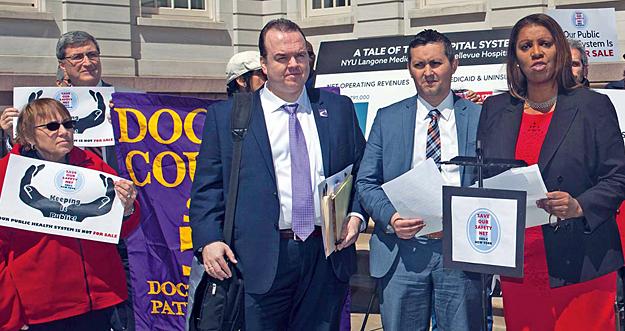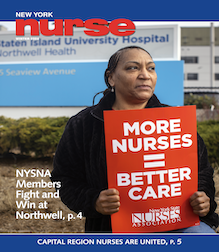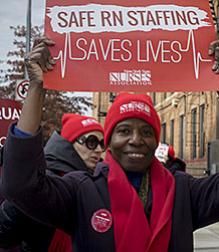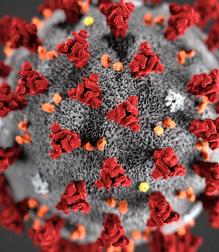
The 2015-2016 legislative session ended with a huge victory for New York’s safety-net hospitals — and the millions of patients who depend on them for care. An Enhanced Safety Net Hospital bill (A9476A/S6948-A) passed both legislative chambers with unanimous votes! It now awaits Governor Cuomo’s signature.
NYSNA was particularly grateful to Assembly Speaker Carl Heastie for his leadership in ensuring that this bill moved out of committee and to a vote by the full Assembly. His determination in behalf of safety-net hospitals has been extraordinary.
Healthcare equity
The legislation establishes a fairer and more equitable state funding formula for safety-net hospitals by directing funding for indigent patients where it is most needed. It creates a new funding category of “enhanced safety-net hospital” that enables hospitals that care for a disproportionately high number of uninsured and Medicaid patients to receive higher Medicaid reimbursement rates and aggregate payments.
It was a coalition of labor and public health advocates that brought the measure to fruition. Our Save Our Safety Net Campaign (SOS-C) partners AFSCME DC 37, Doctors Council, Committee of Interns and Residents, New York Immigration Coalition, the Commission on the Public’s Health System and NYSNA worked tirelessly to see the bill succeed. And AFSCME DC 37 Executive Director Henry Garrido was instrumental in the bill’s success.
Fair funding
Steven Choi, Executive Director of the New York Immigration Coalition, hailed the bill for improving health equity: “New York’s immigrant communities are unfairly excluded from many health insurance programs because of their immigration status, and thus rely on these safety-net providers for the care they need and deserve. This legislation helps keep these safety-net providers sustainable and financially viable, so they can provide this care for immigrants left behind by federal and state programs.”
Hospitals throughout the state that serve large underserved populations should benefit from the bill, including NYC H+H facilities, Interfaith Medical Center, Bronx Lebanon, Erie County Medical Center, Westchester Medical Center, Messina Memorial Hospital, and Champlain Valley Physicians Hospital, among others.
The bill’s timing is especially critical for NYC H+H’s Bellevue Hospital as it faces the prospect of a significant increase in inpatient volume as Mount Sinai’s plan to restructure nearby Beth Israel Hospital moves forward. Beth Israel is the larger of two remaining private sector hospitals in lower Manhattan. In recent years well over half of the facility’s patients were either on Medicaid or uninsured, and a good number of these patients will likely end up at Bellevue or at other H+H facilities. NYC’s public hospital system provides care to one in five New Yorkers and, with the changes at Beth Israel, thousands more will seek inpatient care within the system over the next few years.
The new bill provides a much-needed boost to the revenue of NYC H+H and all public and private sector providers across New York that serve the poor and uninsured.




